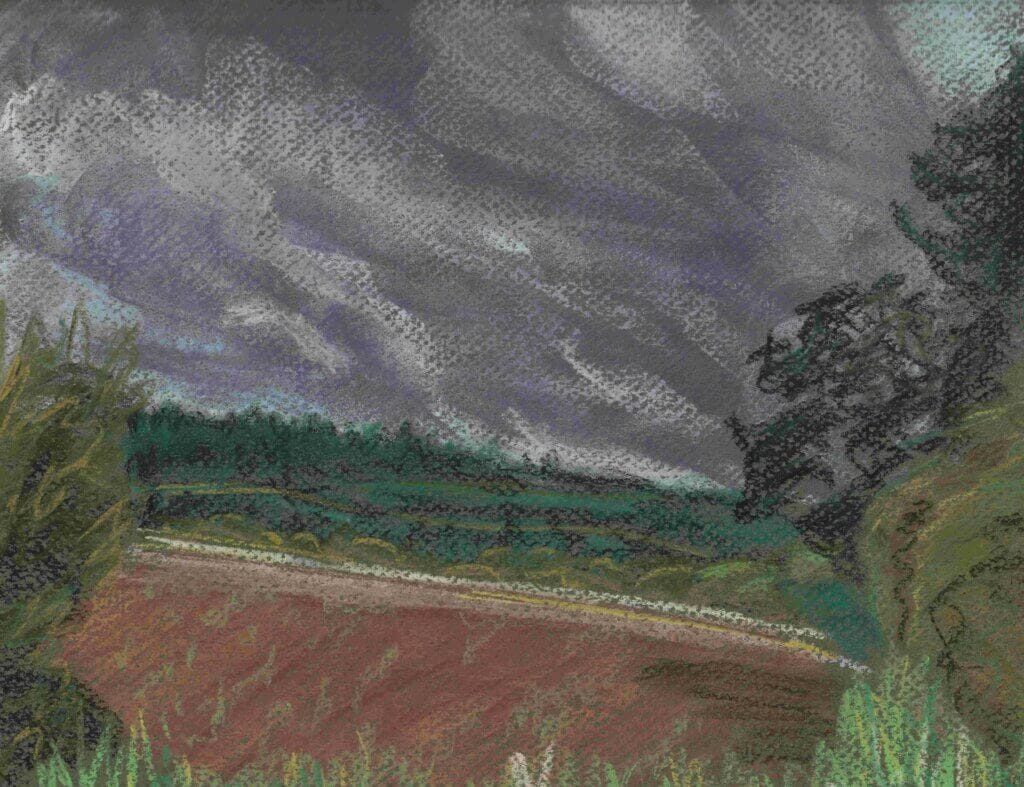
Tinned Salmon
This is last month’s article that I never managed to publish. It was holiday season at Castle Sefton Press and we also had some uninvited visitors. Even though I was going away, the blog was due to go out before I went but at the last minute we had a rodent incursion in the bathroom. Dealing with that took up the time left for the blog and put the subject of tinned salmon completely out of my mind!
Happily, we had a lovely holiday and I am back refreshed – and tanned after the recent heatwave. The rats have also departed, leaving me to concentrate on catching up with this post.
A Reoccurring Theme
I may or may not have a subject in mind for my monthly article, but I never worry about it too much because life always presents something to my mind. Often this happens by way of repetition through something that keeps cropping up in different contexts, raising a little flag in my consciousness. Thus it was with tinned salmon.
A rediscovered pleasure
I’m not sure now why I decided to buy a tin of red sockeye salmon. We are lucky to have an excellent fishmonger in a local market, but I don’t buy salmon from him because I don’t eat farmed fish (admittedly with the exception of bivalves).
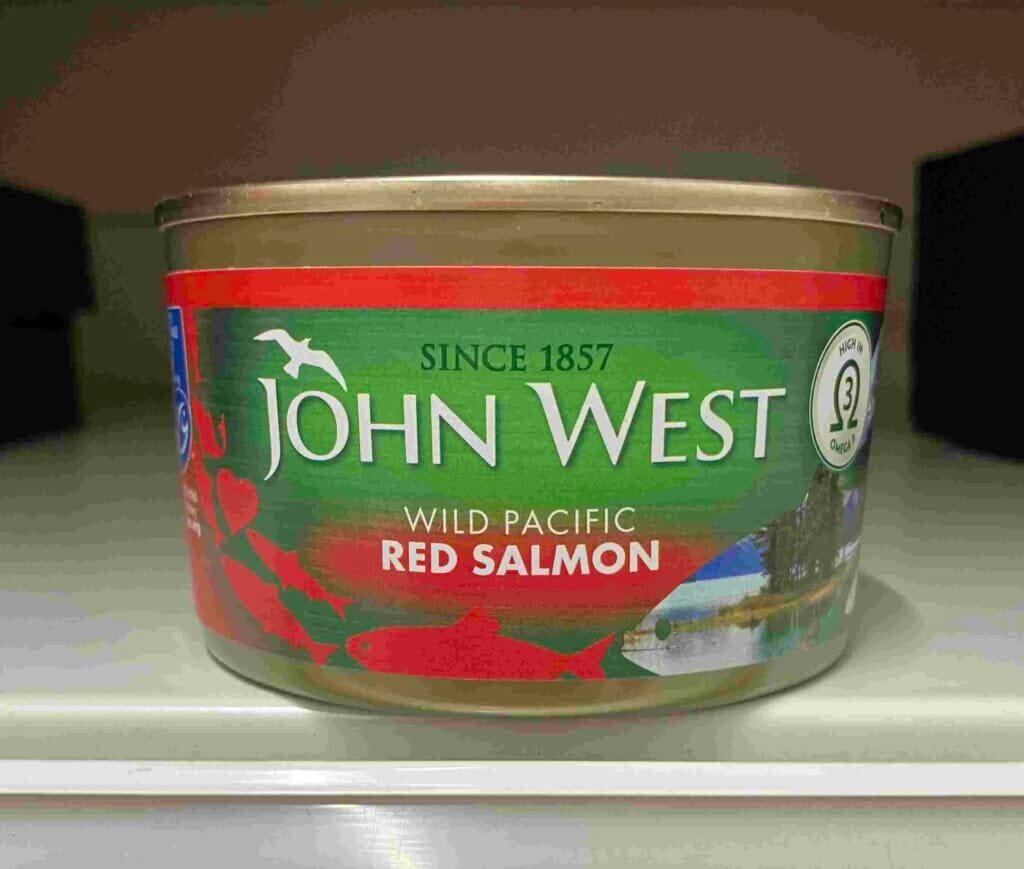
Perhaps I hadn’t had time to go to the market, or we were economising so I’d cut out fresh fish, which is rarely cheap. For some reason, I was browsing the tinned fish shelf in the supermarket, and realised that I hadn’t had tinned red salmon in years. I remembered how much I used to like it.
Environmental concerns
I’m not writing about environmental concerns here. I’ve said that I choose not to buy farmed fish, but you may feel differently. I accept that eating fish at all these days has implications for the health of the planet and our future food supplies.
What I do say, is that for your own health and the wellbeing of all life on Earth, including you and your family, do consider the origins of your food. Become aware of where it comes from and how it is produced. Then, as far as you can afford to, you can make informed choices. What you decide on may be different to my preferences, but base your decisions on knowledge not sales propaganda.
Proustian recollections
Even if you haven’t read Proust, and I haven’t, you may well have heard of the famous scene in his novel In Search of Lost Time where the main character’s memories are drawn forth by the taste of a type of French cake, a madeleine. I don’t think how I experience memory, or what interests me about it, much correspond to Proust’s ideas, but there is no doubt that food has a powerful effect on my recollections.
It was really the appearance of the salmon when I opened the tin rather than taste or smell that made me reflect. The colour, the oily liquid, the speckle of bones and border of thick, grey skin was such a distinctive sight. I haven’t made that sound appetising at all, and it doesn’t look it, but the skin and bones (cooked in the canning to a safely edible texture) used to be considered an addition to the flavour. And as my mother was always quick to point out, they are very nutritious.
Remarkable friends
After a fleeting vision of mashing the contents of such tins with vinegar on dreary Sunday evenings – all Sunday evenings are dreary when you have school the next day – I immediately remembered some close friends of my childhood. Red salmon always marked a special occasion for them.
I mentioned my ‘Uncle’ Arthur Robinson in a previous post, and it was his close friends, Hetty and Derrick Shenton that came to mind. Uncle Arthur and his wife, Aunty Lou, used to invite Hetty and Derrick over for a meal every so often. My poor Aunty Lou lacked confidence as a cook, and I can well remember her anxiety during the preparation of any food for visitors.
Set menu
Fortunately for Lou, whenever Hetty and Derrick came the menu was always the same: tinned red salmon, mashed potato, peas and parsley sauce with Bird’s trifle to follow. There was a sound practical reason for this, in that Derrick had lost all his own teeth and found his dentures very uncomfortable. This was a luxury meal that he could manage without using his teeth.
I’m sure we can all see the funny side of this. There is much humour in the human condition, and I think it’s healthy to enjoy it as long as you’re including yourself as a subject of the joke and not employing it as a weapon. It wasn’t really a matter of fun for poor Derrick though, whose health was perhaps affected by the nutritional restrictions that his dental problems imposed.
A Wonderful Life
Hetty and Derrick were remarkable friends. They lived in a terraced house in a small semi-industrial town. Derrick worked in a textile mill, doing long hours of monotonous work in unbelievable noise and no doubt hazardous conditions. Their home was filled with much-loved animals – dogs, cats, birds, fish and others – Hetty’s paintings and embroidery and Derrick’s music, which he learned and improvised at an electric organ.
They loved the countryside and were keen walkers, going out to explore on a motorbike with Hetty on the back. Underlying everything was their independent Christian spiritualism. This was something they spoke little of to others – it was very much a spirituality rather than a religion – but it clearly gave meaning and joy to everything in their existence, even death.
These were people whom many might smile at from the heights of their modern sophistication. They had little money or education. Yet their lives were richly filled with creativity, nature, mysticism and joy to an unusual degree. I was so lucky to know them.
A Digression on Blandness
In my novel Ghost Train (page 22 for readers of the paperback edition), Zeno refers to the British as culinary magpies “picking out the shiny jewels from all the great cuisines.” But this wasn’t always the case.
There are few now who enjoy the traditional diet of the rural people amongst whom I grew up: no garlic or spices, little frying and few sauces. The most piquant taste was likely to be a pinch of pepper, probably white. In her recent book, Cook, Eat, Repeat, Nigella Lawson has a chapter called ‘The Loving Defence of Brown Food.’ Well, if Nigella can defend brownness, I can stand up for the delights of the bland.
Of course foods that are not highly seasoned are not really bland. You experience the more subtle, mild flavours of the base ingredients, that’s all. Traditional British cooking done well is a good chance to experience this, but I’ll leave a more general discussion of that for another time.
Béchamel Sauce
In the original edition of Rick Stein’s book English Seafood Cookery he talks of reviving his Seafood Thermidor, ‘if the taste for flour-based sauces returns (as it probably will).’ That was in 1988, and my impression is that we are still waiting. Velouté, the flour-based sauce that Stein uses in the book, is seldom cooked now. That’s a shame, because it’s easy, cheap, nutritious and versatile.
Béchamel, the flour-based sauce made with milk, is still made and eaten as a cheese sauce with pasta or cauliflower, but I don’t come across it often in its plain form outside a lasagne. I don’t know why, because it’s quick, economical, filling and delicious. Almost any cooked vegetable makes a lovely meal when coated in Béchamel, gratinated and eaten with some good bread.
I think making Béchamel is a moment to embrace blandness. The sauce has a flat creaminess that lacks the freshness or richness of actual cream. I like to embrace this and rather wallow in it by keeping the seasoning to a minimum. If you let your palate experience it, it’s a sauce with an addictive mildness.
Parsley Sauce
White sauces, as we call Béchamels, with various flavourings were a staple of British home cooking when I was younger. My mother often made onion sauce, a white sauce infused with cloves containing sliced boiled onions. It was delicious with lean roast pork or even chicken, but I have never managed to replicate her recipe and make it taste as I remember.
The standard was parsley sauce, a plain white sauce with added chopped parsley. You still see something claiming to be it in cook-in-the-packet frozen fish. The creamy blandness lightened by the faint aromatic freshness of parsley is good with a robust white fish. I like it with grilled plaice. And it really does make a tasty dinner with tinned salmon, some mashed potatoes and frozen peas.
It’s best of all served with gammon. Wrap your stiffly-textured, savoury, salty meat in a combination of fresh green parsley and pale bland sauce. A culinary match made in heaven.
A word about the parsley.
Far be it from me to disagree with almost everyone in the world who assures us that flat parsley is the superior variety. I only say that, for this recipe, you need the traditional British curly sort. Apart from the flavour, the robustness of the curly leaves holds them together in the sauce.
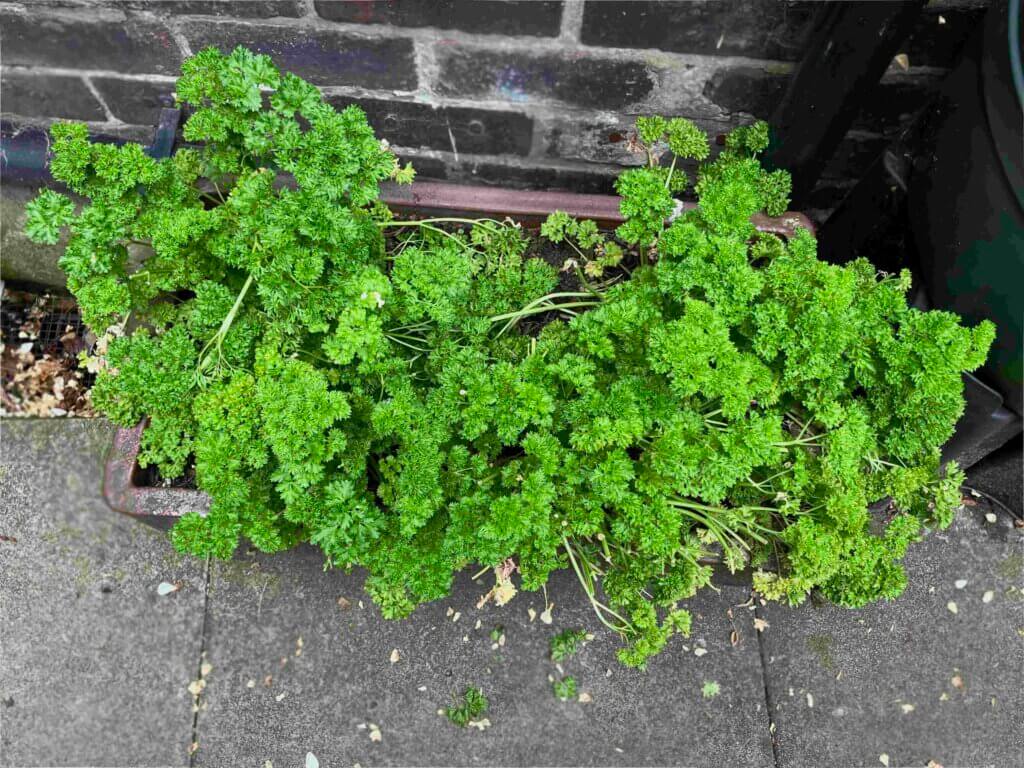
A recipe for Parsley Sauce
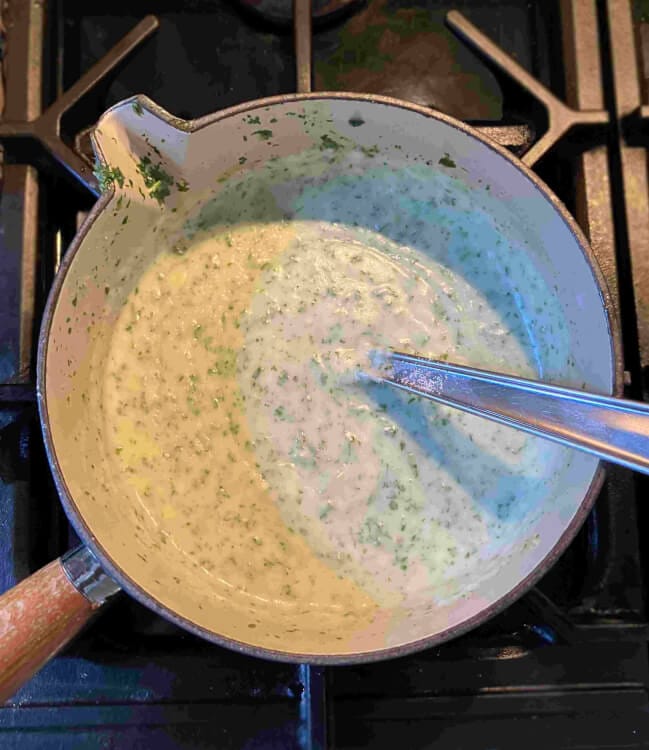
Ingredients
Equipment
Method
- Add the ¾ pint whole milk to the saucepan. Heat the milk gently until it is hot but not boiling. Rinse out the measuring jug and keep it to hand.
- While the milk is heating, chop the ½ – 1 oz fresh parsley, preferably the curly variety finely. Add the parsley to the hot milk, turn off the heat and put the lid on the pan. Leave it to infuse for 30 mins – 1 hour.

- At the end of the infusing time, pour the milk back into the measuring jug. Wipe the pan out with kitchen paper and return it to a low heat. Add the 1 ¾ oz butter to the pan.
- Once the butter is melted, add the flour to the pan. Whisk the 1 ¾ oz plain flour into the melted butter with the flat mini whisk and allow the mixture to cook very gently for about a minute to make a roux. (I’ve added a picture of the type of whisk that is best for this. It’s a really useful tool and not expensive.)

- Now ladle in the milk and parsley mixture a little at a time, whisking the liquid into the roux each time. Once all the liquid is incorporated, you should have a smooth sauce.
- Raise the heat under the pan a little until the sauce bubbles gently, and let it simmer like this, stirring gently for a couple of minutes. While you are doing this, you can stir in 1 pinch salt if you wish.
- The sauce is now ready. If you are not eating it straight away, it keeps well in the fridge and can be reheated, but you must cover the surface of the sauce with clingfilm or damp greaseproof paper to prevent a skin from forming.
Tinned Salmon Again
What did I do with my tin of salmon? What we most often did at home, drain the flesh, mash it with vinegar and eat it with bread and butter. It always makes me think of Mrs Gamp and her pickled salmon in Charles Dicken’s Martin Chuzzlewit.
This recipe was clearly universal across a large part of the country, as it’s exactly how George Dixon eats his in the Dixon of Dock Green episode Andy Steps Up. That story involves stolen tinned salmon, and emphasises that it was a pricey treat for most people in the 1950s and 60s. It must still be for many.
Smoked salmon
I happened to be reading Philip Ziegler’s excellent, though naturally out-of-date, biography Wilson: The Authorised Life at around this time. Wilson was also someone who loved tinned salmon with vinegar, and one of his most quoted remarks refers to him preferring it to smoked salmon.
Wilson is sometimes suspected of faking his ‘man of the people’ image, but I think his salmon preference is true. Most people I knew as a child who had tasted smoked salmon didn’t much care for it. It is so different to the tinned salmon they knew and loved as a cherished luxury that it came as a disappointment.
In those days, you couldn’t buy cheap farmed smoked salmon in a packet. It would be wild Scottish salmon, and you purchased it from a delicatessen who would have a whole side of fish on a board and cut paper-thin slices by hand. It was, from distant memory, mildly savoury, drier than the farmed stuff and utterly delicious.
My generous parents, who were not well off, bought me a slice from just such a shop when I was still quite young so that I could try it. I was always able to love both tinned and smoked salmon and adored it immediately, but they were lukewarm in their enthusiasm. Like Harold Wilson, they didn’t mind smoked salmon, but preferred the robust flavours of the tinned variety.
Tinned Salmon and the Totality of Life
The tinned red salmon that was a luxury to us has been considered peasant food by the rich who can afford to eat wild Scottish smoked salmon regularly. Those who have considered themselves in the upper classes of our society have often been quick to announce that poor working people have no taste or appreciation of fine food. There may have been some truth in that: most of them never had the chance to develop any!
Snobbery
I maintain my lifelong position that both tinned red sockeye salmon and wild Scottish smoked salmon are delicious. You might dislike them from personal taste, or have a preference from propinquity, but they are both intrinsically good foods. Those who think the rich only buy the smoked kind because they are gullible victims of upper-class fashion, or that the poor regard the tinned variety as a treat because they are inferior beings devoid of taste have succumbed to snobbery.
I have written before about snobbery because I find it such a sad thing. Of course it can cause a lot of harm, mental and physical, to those at whom it is directed. But it’s also a tragedy for the snob, because it narrows their horizons so much. Why enjoy one type of salmon and a smug ego when you could experience the deeper joy of two types of salmon and an open mind?
Wider implications
Much of what we do every day and how we think depends on inbuilt assumptions that we have somehow absorbed as truth, such as ‘smoked salmon is automatically better than tinned salmon.’ If we are to negotiate the challenges of life ahead, we need to become aware of these and be prepared to be flexible. You don’t have to like tinned salmon, just realise that there is nothing wrong in liking it.
It’s not a huge leap from putting an arbitrary derogatory label on a foodstuff to putting one on another person. And from there suffering and even atrocities follow.
The Totality of Life
Let’s open ourselves beyond our existing paradigm for our own good. There’s nothing we need to give up. We can still like all the things we like now, but in the knowledge that what other people like is just as valid. Perhaps, we will find a few new things to enjoy and some exciting different perspectives on life.
You can love both wild Scottish smoked salmon and tinned sockeye salmon with vinegar. I’m living proof.
Subscribe to hear about new articles:

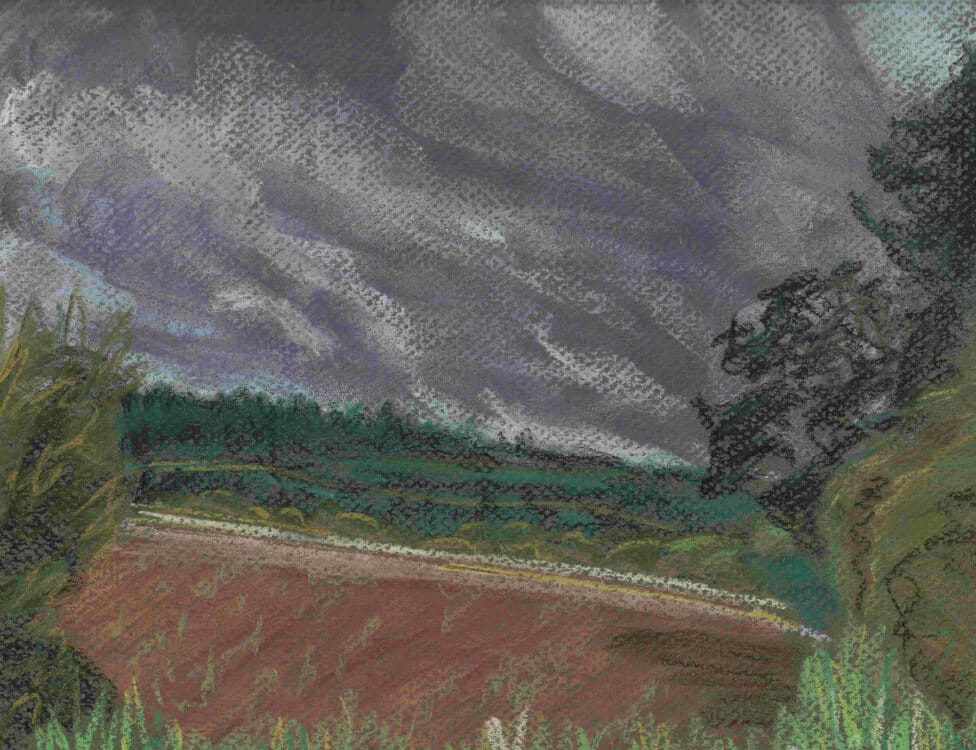


Leave a Reply